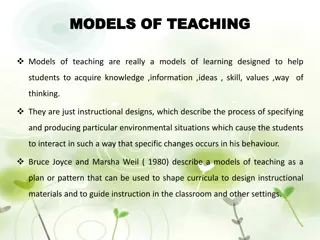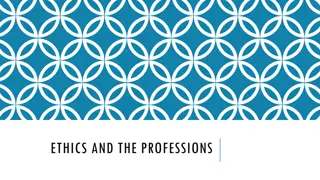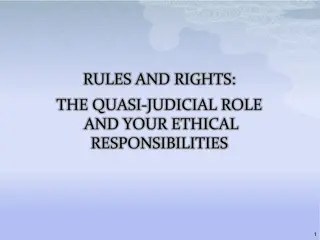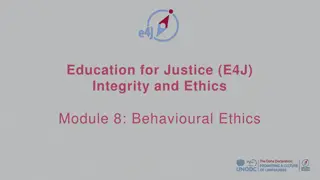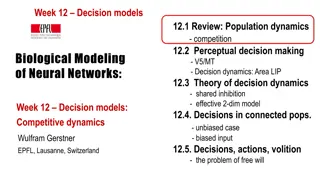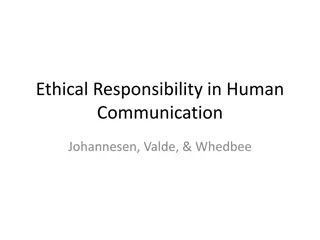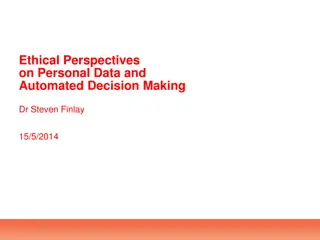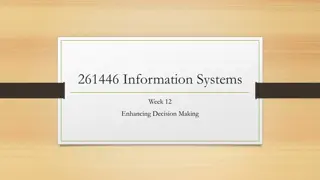Exploring Ethical Decision Making Models and Key Terms
Delve into the intricacies of ethical decision-making by examining models and key terms. Learn how to define and approach ethical dilemmas, understand the differences between values, morals, laws, policies, and ethics, and explore how personal and professional values intersect. Discover the importance of identifying and clarifying values, and how they can evolve over time in the context of ethical decision-making.
Download Presentation

Please find below an Image/Link to download the presentation.
The content on the website is provided AS IS for your information and personal use only. It may not be sold, licensed, or shared on other websites without obtaining consent from the author. Download presentation by click this link. If you encounter any issues during the download, it is possible that the publisher has removed the file from their server.
E N D
Presentation Transcript
PICK A MODEL, ANY MODEL THE VALUE OF MODELS FOR ETHICAL DECISION MAKING Lori Watsen, MSW, LCSW Strengthening Families Training Institute, March 2019
Please take two minutes to jot down notes about the following questions: How would you define an ethical dilemma? When faced with an ethical dilemma what steps do you typically take and/or what resources do you use to work toward a decision and/or plan to address the problem?
Please form small groups of 3-4 and share some of your thoughts and responses: How would you define an ethical concern or dilemma? When faced with an ethical dilemma what steps do you typically take and/or what resources do you use to work toward a decision and/or plan to address the problem?
Key Terms Key Terms what do we mean? what do we mean? Values. Morals. Laws. Policies. Ethics. What rules? Why?
Key Terms Key Terms what do we mean? what do we mean? Values. Morals. Laws. Policies. Ethics. How do these terms differ? Relate?
Key Terms Key Terms what do we mean? what do we mean? Values Values: describe ideas that we value or prize. Things we hold dear and feel have worth. Often have a feeling or affective component. Ideas we aspire to achieve (equity, social justice). Source Source: Allen, K. What is an Ethical Dilemma? What really is important to you? What really is important to you? Values Identification / Clarification Exercises Values Identification / Clarification Exercises What matters most to us can change and shift with time. Why? It can be useful to do a values identification / clarification exercise periodically in the spirit of remaining self-aware of your own personal values and aware of when/how your personal values might align (or collide) with professional values or ethics.
Key Terms Key Terms what do we mean? what do we mean? What matters most to us can change and shift with time. Why? It can be useful to do a values identification / clarification exercise periodically in the spirit of remaining self-aware of your own personal values and aware of when/how your personal values might align (or collide) with professional values or ethics.
Key Terms Key Terms what do we mean? what do we mean? Morals Morals: describe a behavioral code of conduct to which an individual ascribes. Used to negotiate, support, and strengthen our relationships with others. Laws & Policies Laws & Policies: Rules defining correct procedure or behavior. Source Source: Allen, K. What is an Ethical Dilemma?
Key Terms Key Terms what do we mean? what do we mean? Ethics Ethics: prepositional statements (standards) that are used by members of a profession or group to determine what the right course of action is in a situation. Source Source: Allen, K. What is an Ethical Dilemma? Ethics
What professional ethical code do you follow? Social Workers Social Workers National Association of Social Workers Code of Ethics Idaho Code of Professional Conduct (Rule 450) Other Professional Code(s) of Ethics Other Professional Code(s) of Ethics NAEYC (National Association for the Education of Young Children) Code of Ethical Conduct
Key Terms Key Terms what do we mean? what do we mean? Issue Concern Dilemma What s the difference? How do we know when we have a true dilemma on our hands?
Key Terms Key Terms what do we mean? what do we mean? Dilemma Dilemma: a situation in which a difficult choice has to be made between two or more alternatives, especially equally undesirable ones. Ethical dilemma Ethical dilemma: a situation in which a difficult choice has to be made between two courses of action, either of which entails transgressing a moral principle. and/or There is a moral dimension to the question or decision terms like right/wrong, fair/unfair seem to apply. and/or There are at least 2 possible justifiable resolutions.
Two Types of Dilemmas Two Types of Dilemmas Karen Allen, PhD Karen Allen, PhD Absolute Absolute: Two or more ethical standards apply to a situation but are in conflict with each other. Approximate : Approximate : A decision must be made but there are conflicts between values, laws, and policies.
Preliminary Analysis Preliminary Analysis Karen Allen Karen Allen 1) Identify the ethics, morals, values, legal issues, and policies involved. Is it an absolute or approximate dilemma? 1) Distinguish between personal and professional dimensions. 1) Then apply an ethical decision making model.
Why use a model? Why use a model? As we can see from thinking about definitions defining and working through an ethical decision- making process can be complex and muddy. However we should consider it a cognitive, logical process. A model helps us approach it in this way. Decisions are influenced by many different factors and multiple things must be considered. Models help ensure we follow a process and don t miss critical steps in working toward a solution.
Why use a model? Why use a model? Use of a model increases the chances that we will be able to justify / explain our decisions and actions from a professional and ethical framework. It is important to realize that different professionals may implement different courses of action in the same situation. There is rarely one right answer to a complex ethical dilemma. However, if you follow a systematic model, you can be assured that you will be able to give a professional explanation for the course of action you chose. Forester-Miller & Davis, 1996. Source: https://www.yourceus.com/pages/eth3338-section-ii-best-practice-models- of-ethical-decision-making
Common Components / Ingredients in Common Components / Ingredients in Ethical Decision Ethical Decision- -Making Models Making Models Values identification Values identification personal values, professional values, societal values. Note: Conflict between personal and professional values should not be considered an ethical dilemma. In these cases we are obliged to lead with / act upon our professional values. Reviewing professional Code of Ethics Code of Ethics (For social workers, the NASW Code of Ethics) Considering and evaluating different courses of action Considering and evaluating different courses of action and potential pros / cons of each Benefit / Harm analysis Benefit / Harm analysis Consultation! Consultation!
Common / Well Common / Well- -Known Existing Ethical Known Existing Ethical Decision Decision- -Making Models for Social Workers Making Models for Social Workers Elaine Congress ETHIC Model of Decision Making Elaine Congress ETHIC Model of Decision Making Reamer & Conrad: Essential Steps for Ethical Problem- Solving Berg-Weger, 2005; 2010 Ethical Rules Screen, Dolgoff, Lowenberg, & Harrington
Elaine Congress Elaine Congress ETHIC Model of Decision Making ETHIC Model of Decision Making E E - Evaluate relevant personal, societal, agency, client and professional values T T Think about what ethical standard of the NASW Code of Ethics applies, as well as relevant laws and case decisions H H Hypothesize about possible consequences of different decisions I I Identify who will benefit and who will be harmed in view of social work s commitment to the most vulnerable C C Consult with supervisor and colleagues about the most ethical choice
Reamer & Conrad: Essential Steps for Ethical Reamer & Conrad: Essential Steps for Ethical Problem Problem- -Solving Solving 1. DETERMINE whether there is an ethical issue or/and dilemma. Is there a conflict of values, or rights, or professional responsibilities? 1. IDENTIFY key values & principles involved and the meanings and limitations attached to these competing values. 1. RANK the key values or ethical principles which, in your professional judgment, are most relevant to the issue or dilemma. What reasons can you provide for prioritizing one competing value / principle over another?
Reamer & Conrad: Essential Steps for Ethical Reamer & Conrad: Essential Steps for Ethical Problem Problem- -Solving Solving 4. DEVELOP an action plan that is consistent with the ethical priorities that have been determined as central to the dilemma. 5. IMPLEMENT your plan, utilizing the most appropriate practice skills and competencies. 4. REFLECT on the outcome of this ethical decision-making process.
Ethical Decision Making Model Ethical Decision Making Model Berg Berg- -Weger Weger Identify ethical issue Explore personal biases Identify individuals, groups, organizations likely to be affected Identify all courses of action and participants involved Examine these choices and reasons for and against each decision Consult with colleagues and/or experts Make decision and document progress Monitor, evaluate and document the decisions
Ethical Rules Screen Ethical Rules Screen Dolgoff Dolgoff, , Lowenberg Lowenberg, & Harrington , & Harrington Examine the Code of Ethics Code of Ethics to determine if any of the Code rules are applicable. Remember - these rules take precedence over your own personal value system. If one or more of the Code rules apply, follow the Code rules. If the Code does not address the specific problem, or several Code rules provide conflicting guidance, use the Ethical Principles Screen.
Ethical Rules Screen Dolgoff, Lowenberg, & Harrington 1. Protection of Life 2. Equality and Inequality 3. Autonomy and Freedom 4. Least harm 5. Quality of life 6. Privacy and confidentiality 7. Truthfulness and full disclosure
Lets Practice! Let s Practice! Form groups of 4-6. Read your case scenario. Do a preliminary analysis: Is this an ethical dilemma? Why or why not? Discuss / work through your assigned scenario using your assigned model or tool. Make a plan for action. Be ready to present your plan and key considerations to the larger group. If you finish early, choose an additional case and use adifferent / new model to guide your discussion and decision-making process.
Debrief Debrief How easy (or difficult) was it to come to a decision? Did everyone in your group agree? In what ways were the decision-making models helpful? Can you see yourselves using these models in your day-to- day practice / work? Why or why not? What might increase the chances of you intentionally using a model when faced with an ethical dilemma or decision?
Other Questions? Comments? Reflections? Other Questions? Comments? Reflections?
Thank you! Thank you!
References References ETH3338 Section 2: Best Practice Models of Ethical Decision Making. From: https://www.yourceus.com/pages/eth3338-section-ii-best-practice-models-of-ethical-decision- making Allen, K. 2012. What is an Ethical Dilemma? The New Social Worker, Spring 2012, 19(2). Ethics Committee of the Minnesota Council on Family relations, Ethical Thinking & Practice for Parent and Family Life Educators. Retrieved from: https://mn.ncfr.org/wp- content/uploads/sites/3/2014/02/ethical_thinking_and_practice.pdf Feeney, S. & Freeman, N. (2015). Focus on Ethics: A Difficult Working Relationship: The Response. Retrieved from: : https://www.naeyc.org/resources/pubs/yc/sep2015/difficult-working- relationship-response E. Feeney, S. & Freeman, N. (2016). The Situation - Make Sure My Child Drinks Her Milk! . Retrieved from https://www.naeyc.org/resources/pubs/yc/sep2016/focus-on-ethics





